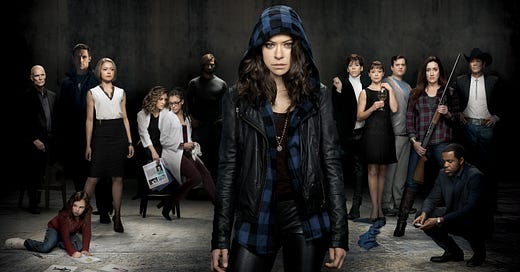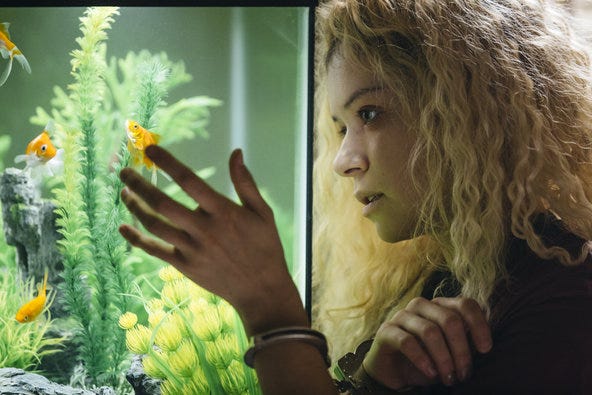Track 4: Orphan Black
Identity, ethics, and sisterhood meld into a rich, emotionally complex series.
TW: Self-Harm, Suicide
There is just something about a BBC show that simply does not miss. Orphan Black is one of those shows that kept popping up on Comcast OnDemand back when I was still living with my parents in 2014. The first season was free to watch for the month ahead, leading up to the new season. Deciding to give it a go, I was immediately absorbed into the chaos of clone world.
I am not skilled in the sciences, but that has never stopped me from being absolutely fascinated by genetics, cloning, and experimentation, as well as the ethics (or lack thereof) behind it. Project MKUltra has led me down many late-night rabbit holes. Watching Orphan Black tickled something in my brain, much in the same way that those rabbit hole deep-dives did. The world building and character development? Strong from the jump. Creators Graeme Manson and John Fawcett did a sensational job of creating characters that you care deeply about, that you root for, and that you completely loathe.
For these reasons and more, Orphan Black will always be one of my top 3 favorite shows of all time. I have countless memories of watching episodes with my husband (then-boyfriend) on the couch at my parents’ house, commandeering the downstairs TV so we could really absorb the content on the “big screen.” This show has made me laugh, cry, and ponder human life time and time again - the fragility of it, the duplicity of it, the blessing of it.
THE TRACK SYNOPSIS
Orphan Black follows the journey of Sarah Manning, an aimless Brit in Canada, whose life is changed forever when she witnesses the suicide of a woman who looks exactly like her. Aching for a fresh start so she can resume custody of her daughter, Sarah assumes the dead woman's identity, only to discover a shocking truth: they are clones. Thus, she is set upon a whirlwind journey of self-discovery and danger, with human cloning and genetic manipulation at the core of it all.
Over the course of 5 seasons, we watch Sarah and her “sestra” clones navigate terrors and truths, weaving complex and thoughtful storylines that tackle themes of bodily autonomy, the power of identity, the ethics of science, and nature versus nurture - just to name a few. Tatiana Maslany is a powerhouse in this series, playing multiple characters with unmatched talent and ease. Lovers of science, characters with depth, and shocking plot twists will enjoy every episode of this dark, beautiful show.
CAST OF CHARACTERS
A note: there are so. many. freaking. characters in this show, the list would never end. Below are the major hitters of the series as a whole.
Clone Club
Sarah: A rough-and-tumble Brit looking to reclaim her daughter, Kira, from her foster mom, Siobhan. While she is one of many genetic clones, Sarah is also the identical twin of Helena, both of whom were separated at birth.
Helena: Initially raised in a Ukrainian convent, Helena grows up convinced that she is the “original” clone, killing as many of the others as possible before she meets her twin, Sarah, and everything changes.
Cosima: Ph.D. student Cosima studies Experimental Evolutionary Developmental Biology and when we meet her, she is aware of a few clones already. She works tirelessly to learn more about a respiratory illness that seems to plague some of the clones.
Alison: A stay-at-home mom of two, Alison is roped into the world of Clone Club, often having to work against her own biases to help her sisters obtain important information or complete dangerous tasks.
Rachel: Unlike the others, Rachel grew up aware that she was a clone. She works with the Dyad Institute and consistently manipulates her fellow sisters, often working to capture and/or use the clones for her own selfish motives.
Beth: Though Beth dies in episode one, we learn a lot about her and her involvement in Clone Club. She is a damaged cop aware of her fellow clones and the forces working against them.
Non-Clones
Felix: Sarah’s foster brother, Felix, also has a questionable party past, but proves to be loyal to the clones, helping them through various trials and tribulations.
Siobhan: Sarah and Felix’s foster mom, Siobhan, is initially suspected to be involved with Project LEDA, a cloning program through the Neolutionists (a group seeking to control human evolution through genetic manipulation). She is a major force of protection and aid for the clones.
Art: Working alongside Beth, veteran detective Art is absorbed into the clones’ world after meeting Sarah, who assumes Beth’s identity after she dies. Art is another very loyal and selfless characters dedicated to keeping the clones safe.
Kira: Sarah’s young daughter, Kira, is the only offspring to come from the LEDA clones. Therefore, she is often a target and object of study, both willingly and unwillingly.
Paul: Paul is Beth’s monitor, who falls in love with her while fulfilling his duty. After her death, he eventually joins the clones in their efforts to take down those threatening their livelihoods.
Delphine: Initially a research associate at the Dyad Institute, Delphine starts a romantic relationship with Cosima and becomes pivotal in helping her study her sisters and learn more about their true nature.
Donnie: Alison’s bumbling oaf of a husband, who also happens to be her monitor. Upon discovering his wife’s clones, she helps in their efforts to take down Dyad, Neolution, and other untoward organizations.
FAVORITE EPISODES
Season 1, Episode 4: Effects of External Conditions
Season 2, Episode 5: Ipsa Scientia Potestas Est
Season 3, Episode 2: Transitory Sacrifices of Crisis
Season 4, Episode 9: The Mitigation of Competition
Season 5, Episode 8: Guillotines Decide
FAVORITE CHARACTER
Helena will always be my favorite character of the entire series. Her life was so riddled with trauma in ways that I resonated with deeply. I can still recall watching Helena self-harm in the first season and feeling that flush of familiarity at a battle that I myself faced for many years. The mixture of self-loathing and near self-idolization that she embodied felt discernable and sharp. To boot, she is hands-down the most unhinged clone in the group, exhibiting some inane behavior that I often felt during bouts of mania in my college years.
DECONSTRUCTING THE TRACK
Orphan Black has had a profound impact on the way that I think about human bodies and the indignities that people suffer at the loss of autonomy. In an age where the rights of women and trans people are being systematically stripped away, I think the themes that Orphan Black drove home during its run are more important today than they were even a decade ago. Through narrative storytelling and attentive scenes and scenarios, we see the consequences of taking away choice. We see the burdens that these characters have to bear when they are treated like experiments, and not as people. We feel the anguish and strife of those working against systems that want to determine your value and self-worth in relation to the skin you’re in, your sex at birth, what it is that you do with your body. Sure, this series really delves into the science of it all, applying that lens of cloning and genetics, but the overarching themes certainly apply to real-time, persistent issues that we face today.
All of that to say, if you are looking for a heavy, but insightful series that pulls you in and sends you off a more considerate person, Orphan Black is a must watch.
Thanks for listening.






